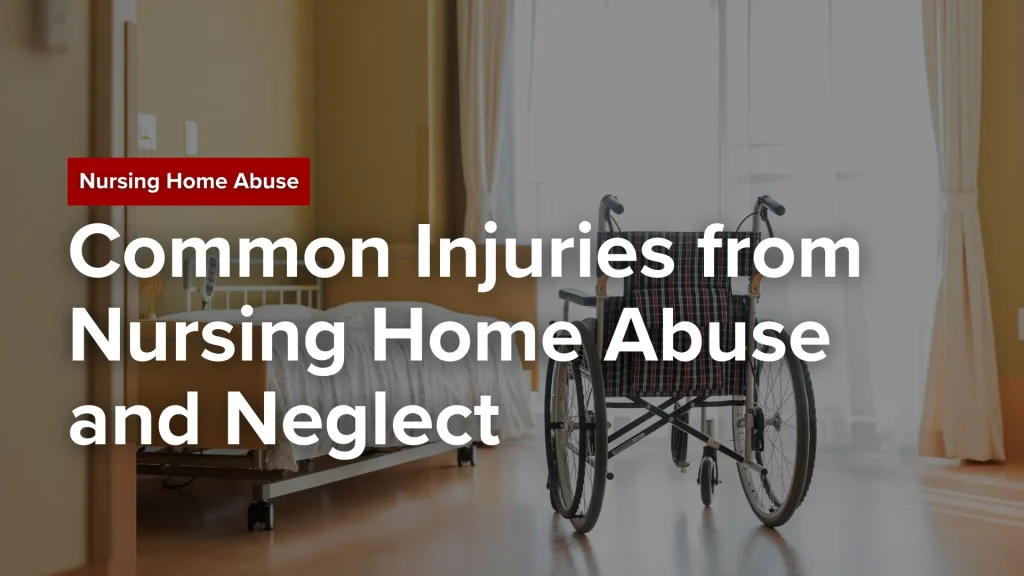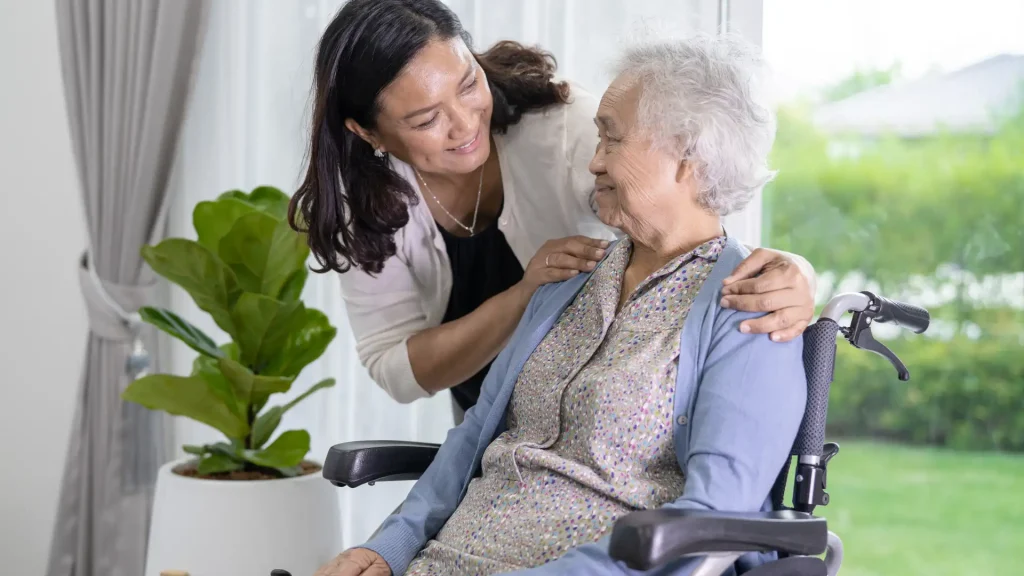 When placing a loved one in a nursing home, you expect that they will be cared for with kindness and respect. However, that doesn’t always happen. Across the United States, many residents suffer injuries from nursing home abuse. These injuries can be physical, emotional, or even financial, and they often go unreported or unnoticed until the damage is severe. Recognizing these injuries is key.
When placing a loved one in a nursing home, you expect that they will be cared for with kindness and respect. However, that doesn’t always happen. Across the United States, many residents suffer injuries from nursing home abuse. These injuries can be physical, emotional, or even financial, and they often go unreported or unnoticed until the damage is severe. Recognizing these injuries is key.
They can be a loud warning that something is very wrong. That’s why it’s so important to know what to look for—common nursing home injuries like unexplained bruises, bedsores, or frequent falls can signal neglect or abuse that needs immediate attention.
Injuries as Signs of Nursing Home Abuse or Neglect
Not all injuries happen by accident. Some injuries suggest mistreatment, neglect, or a dangerous environment. For example, repeated bruises or unexplained hospital visits might indicate something isn’t right. Even one fall may seem like a slip-up, but a pattern of falls can mean the nursing home isn’t taking basic safety steps.
Nursing homes have a legal duty to care for residents. That means keeping them safe, providing them with the right food and medicine, and treating them with dignity.
When a facility fails to do that, and a resident gets hurt, it could be considered abuse or neglect. In such cases, families should understand the legal steps for nursing home abuse, which may include reporting the incident, gathering evidence, and consulting an attorney to protect their loved one’s rights.
Common Physical Injuries From Nursing Home Abuse
Some of the most visible signs of elder abuse include physical injuries. These can happen when staff handle residents roughly, ignore their needs, or fail to supervise them properly.
- Elder bruising and broken bones can happen from rough handling or physical abuse. If a resident suddenly has black-and-blue marks or unexplained bruises, it’s time to ask questions.
- Fracture nursing home patient cases are far too common and often preventable. Broken hips, wrists, and arms usually happen because no one was there to help.
- Pressure ulcers, or bedsores, develop when residents sit or lie in the same spot for too long without being moved. They’re painful and can get infected quickly.
- Malnutrition elder care problems happen when residents aren’t getting enough to eat or are given food that doesn’t meet their health needs.
- Dehydration in elderly care can cause confusion, weakness, and serious medical complications. If someone’s lips are dry, skin looks dull, or they seem dizzy, they may not get enough fluids.
- Infections from untreated wounds often show that basic hygiene and medical attention are being ignored.
These kinds of nursing home neglect injuries can be signs of physical abuse in nursing homes.
Emotional and Psychological Injuries
Not every injury leaves a visible mark. Many nursing home residents also suffer mentally and emotionally.
- Symptoms of emotional trauma in the elderly can include crying spells, a lack of interest in activities, or acting scared for no apparent reason.
- Mental abuse symptoms in the elderly may show up as sudden fear, confusion, or silence when certain staff members enter the room.
- Sudden behavior changes in the elderly are often a red flag. If your loved one becomes withdrawn or nervous, trust your gut.
- Some residents even show signs of PTSD, like panic attacks or nightmares, especially after severe abuse.
When someone’s personality changes without a medical reason, it could be due to emotional or verbal mistreatment.
Falls and Mobility-Related Injuries
Falls in nursing homes often indicate that residents aren’t getting the care they need. While occasional falls may happen, frequent ones usually point to poor supervision or unsafe conditions. Wet floors, cluttered walkways, broken mobility aids, and slow response times all increase the risk. Many residents are left vulnerable without proper help getting in or out of bed or using the bathroom. These falls can lead to serious harm, including broken bones or head injuries, in elder care. Over time, the fear of falling again may cause residents to stop moving as much, leading to further health decline.
Please read more about suffering from injury here: Thousands suffer injuries during Halloween
Medication Errors and Their Consequences
Nursing homes are responsible for giving medications correctly. But sometimes:
- Staff give too much or too little medicine
- They give the wrong medication altogether
- They use medicine to make someone sleepy instead of treating a condition
Overmedication or medication errors can lead to confusion, falls, and even death. These mistakes can lead to neglect-related hospitalization, which means the resident ends up in the emergency room due to something that could have been prevented.
Sexual Abuse Injuries
Sexual abuse signs in nursing homes are an alarming issue, and many victims stay silent due to fear, memory loss, or shame. Warning signs include unexplained cuts or bruises, unusual infections, fear of being touched or undressed, and trouble sleeping. These injuries often go unnoticed, but they signal something serious. Families must stay alert and speak up if their loved one’s behavior or condition feels off.
Financial Exploitation as a Form of Emotional Harm
 Some staff or even fellow residents may take advantage of older adults. They may steal money, pressure them into changing legal documents, or “borrow” valuables. While it doesn’t leave a physical scar, this kind of abuse causes stress, confusion, and fear. Some things to look out for include:
Some staff or even fellow residents may take advantage of older adults. They may steal money, pressure them into changing legal documents, or “borrow” valuables. While it doesn’t leave a physical scar, this kind of abuse causes stress, confusion, and fear. Some things to look out for include:
- Missing items
- Sudden changes in financial accounts
- Bills going unpaid
- Your loved one seems upset when finances are mentioned
Long-Term Impact on Health and Life Expectancy
One injury can take a toll, but repeated harm from neglect or abuse often leads to long-term health problems. These may include chronic pain, limited mobility, weight loss, and ongoing anxiety. Over time, the physical and emotional strain reduces quality of life and may even shorten a resident’s lifespan. For many, an emergency room visit from nursing home injuries signals the beginning of a severe and often permanent decline.
Take Action Immediately If You Suspect Abuse
If you think your loved one is being hurt or ignored in a nursing home, take action right away. You should:
- Document everything. Take photos of visible injuries. Keep track of changes in behavior or mood.
- Talk to management. Ask direct questions. See how they respond.
- Report abuse. Call your local Adult Protective Services or state health department.
- Contact a law firm. Don’t wait. You have legal rights, and so does your loved one.
At Karlin, Fleisher & Falkenberg, LLC, we take every case of nursing home abuse in Illinois seriously. If you have noticed elder abuse red flags or suspect hygiene neglect in nursing facilities, take action immediately to protect your rights and help your loved one. Our team wants to hear from and help you. Call 312-346-8620 to speak with our nursing home abuse attorney immediately. Your loved one’s safety, comfort, and dignity should never be questioned.
